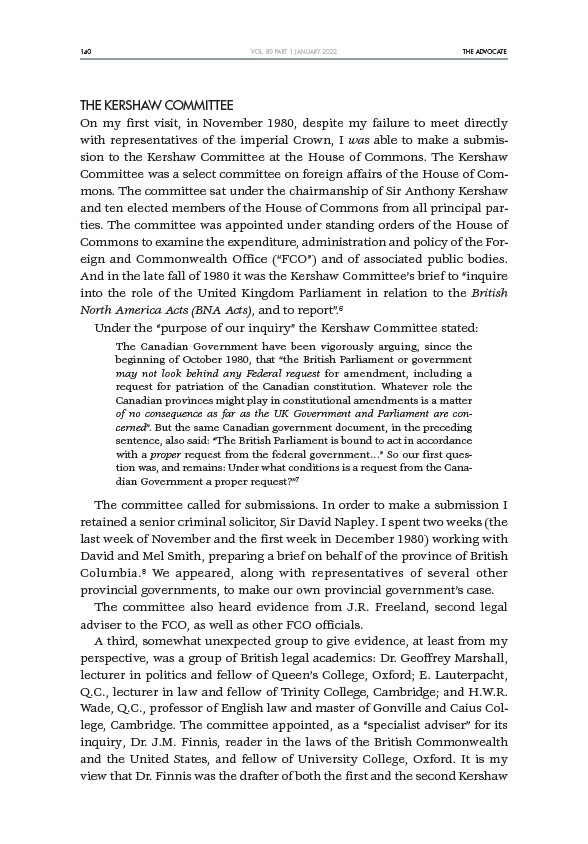
140 THE ADVOCATE
VOL. 80 PART 1 JANUARY 2022
THE KERSHAW COMMITTEE
On my first visit, in November 1980, despite my failure to meet directly
with representatives of the imperial Crown, I was able to make a submission
to the Kershaw Committee at the House of Commons. The Kershaw
Committee was a select committee on foreign affairs of the House of Commons.
The committee sat under the chairmanship of Sir Anthony Kershaw
and ten elected members of the House of Commons from all principal parties.
The committee was appointed under standing orders of the House of
Commons to examine the expenditure, administration and policy of the Foreign
and Commonwealth Office (“FCO”) and of associated public bodies.
And in the late fall of 1980 it was the Kershaw Committee’s brief to “inquire
into the role of the United Kingdom Parliament in relation to the British
North America Acts (BNA Acts), and to report”.6
Under the “purpose of our inquiry” the Kershaw Committee stated:
The Canadian Government have been vigorously arguing, since the
beginning of October 1980, that “the British Parliament or government
may not look behind any Federal request for amendment, including a
request for patriation of the Canadian constitution. Whatever role the
Canadian provinces might play in constitutional amendments is a matter
of no consequence as far as the UK Government and Parliament are concerned”.
But the same Canadian government document, in the preceding
sentence, also said: “The British Parliament is bound to act in accordance
with a proper request from the federal government…” So our first question
was, and remains: Under what conditions is a request from the Canadian
Government a proper request?”7
The committee called for submissions. In order to make a submission I
retained a senior criminal solicitor, Sir David Napley. I spent two weeks (the
last week of November and the first week in December 1980) working with
David and Mel Smith, preparing a brief on behalf of the province of British
Columbia.8 We appeared, along with representatives of several other
provincial governments, to make our own provincial government’s case.
The committee also heard evidence from J.R. Freeland, second legal
adviser to the FCO, as well as other FCO officials.
A third, somewhat unexpected group to give evidence, at least from my
perspective, was a group of British legal academics: Dr. Geoffrey Marshall,
lecturer in politics and fellow of Queen’s College, Oxford; E. Lauterpacht,
Q.C., lecturer in law and fellow of Trinity College, Cambridge; and H.W.R.
Wade, Q.C., professor of English law and master of Gonville and Caius College,
Cambridge. The committee appointed, as a “specialist adviser” for its
inquiry, Dr. J.M. Finnis, reader in the laws of the British Commonwealth
and the United States, and fellow of University College, Oxford. It is my
view that Dr. Finnis was the drafter of both the first and the second Kershaw